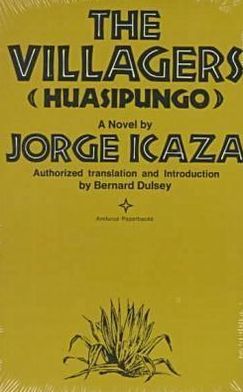

 |

|

The average rating for Villagers (Huasipungo) based on 2 reviews is 4 stars.
Review # 1 was written on 2015-10-11 00:00:00 Linda Daugherty Linda DaughertyThis is a work of social realism/protest literature, which portrays a dire situation in intimate detail but has limited literary value. Huasipungo was originally published in 1934 (followed by substantial revisions in 1953 and 1960, aimed at making the novella more emotionally effective). It portrays the oppression of indigenous people in Ecuador, who are bound to the land, forced to work for little or no pay for rich landowners, and suffer all kinds of abuse with no recourse - the church is shown to be complicit, with the local priest fleecing the serfs however he can, and the army ready to step in with no questions asked at any hint of rebellion. This system was apparently in effect until land reform in 1964. "Huasipungo" is the indigenous word for the parcels of land worked as subsistence farms - but only at the will of the landowner, who could remove people from their homes at any time. The narrative begins with a landowner, Alfonso Pereira, who relocates to his property in the Andes after many years of absentee management. His goal is development, aided by foreign investors. From there, the novella is a catalog of the machinations of the powerful and the abuses suffered by the Indians. It doesn't quite have a protagonist: Alfonso is its most prominent character, but functions as a villain, while its major indigenous character, Andres Chiliquinga, is often absent from its pages. To the modern American reader, choosing Andres as the symbol of indigenous suffering and vehicle for the readers' sympathies is puzzling: he beats his wife, and he's not very bright even compared to his equally uneducated peers. Throughout the book, he is easily manipulated and shows a complete lack of forethought or ability to consider the probable consequences of his actions. This is after two revisions that, according to the introduction to my edition, were primarily aimed at making Andres a more human and sympathetic character. I can only presume that the original readers' expectations were very different from mine. Nevertheless, I didn't wholly dislike this book. The writing is quite vivid, and reading it is a cultural experience. There is a lot of disembodied bystander dialogue, which gives the reader the sense of being a fly on the wall in this place and time. While a challenging read, I think it's a valuable historical document and learned quite a bit about Ecuador. If you do plan to read Huasipungo in Spanish, the Stockcero edition seems to be a good choice. It includes both footnotes and a glossary, which were essential to my understanding of the Quichua words that pepper the text. (Quichua, as it turns out, is not a misspelling of Quechua but a variation spoken in Ecuador.) And while a 42-page introduction seems excessive for a 168-page novella, it does include some interesting information. On the downside, the occasionally misplaced punctuation and line breaks are just sloppy. |
Review # 2 was written on 2016-09-26 00:00:00 Michael Clauson Michael ClausonNot since the Jungle Novels of B. Traven has there been such an indictment of the treatment of Indians by white landowners. Don Alfonso Pereira is in debt to his uncle Julio, whereupon Julio convinces him to talk his Indians into building a road so that gringos could tear down the forests and drill for oil. Written in 1934, Huasipungo by Jorge Icaza tells the story of the brutality, starvation, and natural disasters that come in the wake of Don Alfonso's road. The landowner refuses to show any weakness, and winds up doubling down on all the injustices he causes. At the same time, he rapes the young women from the huasipungos or Indian huts and insists on being extra cruel lest he be thought of being weak by the Indians and his partners. This Ecuadorian novel is not well known to Norteamericanos, but it should take its place beside the novels of Traven and Paraguay's Augusto Roa Bastos, Brazil's Jorge Amado, Guatemala's Miguel Angel Asturias, and Uruguay's Eduardo Galeano. |
CAN'T FIND WHAT YOU'RE LOOKING FOR? CLICK HERE!!!